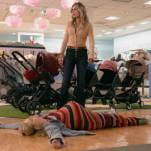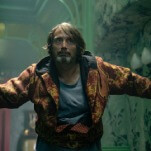The last decade-plus of Channing Tatum’s movie career has featured so much ingratiation, such a relentless campaign to shift him from the boring Step Up guy to the charming Magic Mike guy, that sometimes it seems like him playing a criminal (something he does slightly less often than play ex-military) is the only way to mitigate the cuddliness offensive. Roofman suggests even that strategy may be faulty. It’s possible that the real-life thief Jeffrey Manchester could have been as endearing as an abashed, family-loving Tatum during his robbery of many fast-food locations, his escape from prison, and his subsequent residency in the walls of a Toys “R” Us. (Actually, in real life, it was a Circuit City adjacent to a Toys “R” Us.) Some credits-footage testimonials suggest that the movie is not exaggerating Jeffrey’s generally positive nature. But Tatum plays him with such sympathy that it takes the co-writer/director of Blue Valentine to keep the story grounded.
Filmmaker Derek Cianfrance may actually have found an ideal foil in Tatum, who necessarily appears to take himself less seriously than Ryan Gosling did in his two Cianfrance pictures so far. (Tatum was apparently offered Blue Valentine early on, but turned it down.) Cianfrance shoots Roofman in the unvarnished tones of a ’70s-era character study; in its celluloid-grain, light-crime throwback, it recalls The Old Man And The Gun, which is to say it’s at least connected to ’70s-influenced movies if not the genuine articles from that decade. Regardless, this texture provides the right counterpoint to the stealth slickness of Tatum’s just-plain-folks routine. Rather than a zany montage of Jeffrey’s criminal exploits, Cianfrance captures them patiently, even respectfully. He emphasizes that there’s thoughtful process behind at least part of Jeffrey’s feckless life, while still portioning out some antics, like Tatum scaling a wall fully nude.
There’s no record scratch opening, but there is some narration filling in the details: After a stint in the service (adding to Tatum’s ex-military column alongside his lovable-criminal column), Jeffrey has trouble supporting his three children, and is particularly ashamed of the chintzy sixth birthday party he throws for his daughter. (With coaching from her dad, she reports back to her mother: “We all did our best.”) So he robs a bunch of McDonald’s, which works until it doesn’t; once busted, he’s handed a multi-decade sentence despite his polite and nonviolent bedside manner. As his old Army buddy Steve (LaKeith Stanfield) points out, Jeffrey is a champion noticer, so he meticulously plots a clever escape, then absconds to nearby-but-not-too-nearby Charlotte, North Carolina. There, he hides out at a Toys “R” Us, the set design of which will cause flashbacks in audience members of a certain age. (The movie is set primarily in 2004.) As he starts to poke his head out into the community using an assumed name, he meets single mom Leigh (Kirsten Dunst)—actually meets her in person, that is, after first noticing her as a Toys “R” Us employee. They begin to date.
Their courtship is more sweet than misguided, supported by the no-fuss truthfulness Dunst brings to the role. The scene where Leigh asks Jeffrey out is so gently and unobtrusively well-acted, with such offhand naturalism, that it’s almost hard to believe it comes from someone who’s been in Hollywood productions since age seven. Leigh’s sincerity also underlines how Jeffrey clearly sees her and her two daughters as an instant substitute for the family he desperately misses and cannot contact. That doesn’t make his love for them any less genuine, but it does provide heartbreaking (if simplistic) psychology behind him rarely showing up to a date or a gathering empty-handed. There’s a subtle hint of desperation behind Tatum’s dancerly performance flourishes; this is a man who wants to feel like he’s providing something.
The Steven Soderbergh version of this story would probably tease that anxiety out further. It would also almost certainly lean harder on the cruel mechanics of capitalism: How it drives Jeffrey from his family, provides a string of one-size-fits-all venues for his robberies followed by an outsized punishment, and finally creates a surreal parody of shelter and security with his secret toy-store hideaway. In fact, the Steven Soderbergh version of this story did do something like that, minus the toys, when Logan Lucky had Tatum’s character robbing a NASCAR venue—one just outside Charlotte, to boot. The combination of the same metro area, Tatum moved to tears by a similarly aged daughter, and the occasional wackiness makes it hard to avoid a comparison that ultimately favors the Soderbergh picture. Logan Lucky is snappier than Roofman and, in the end, more moving. As much as Cianfrance can claim a more realistic tone, a few scenes with the transparently villainous store manager Mitch (Peter Dinklage) are as broad as anything in Logan Lucky and not nearly as funny.
There are even times when it feels like Cianfrance, who chronicled such tragedy in Blue Valentine and The Place Beyond The Pines, is scrubbing his characters a little cleaner than usual. There’s not even a trace of dutiful piousness to Leigh’s work with her local church, and only the slightest hint of some greater aggression or maladjustment beneath Jeffrey’s puppy-dog surface. Then again, it’s nice to see Cianfrance working in a less melodramatic key, with conflict at a low simmer, and he doesn’t cop out on the reality of the situation. That’s the most authentically ’70s-cinema quality of Roofman: It’s a star vehicle for Tatum and Dunst that can’t put all of its faith in the healing power of charisma and chemistry.
Director: Derek Cianfrance
Writers: Derek Cianfrance, Kirt Gunn
Starring: Channing Tatum, Kirsten Dunst, LaKeith Stanfield, Peter Dinklage, Melonie Diaz, Ben Mendelsohn
Release Date: October 10, 2025








































